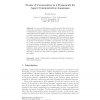Free Online Productivity Tools
i2Speak
i2Symbol
i2OCR
iTex2Img
iWeb2Print
iWeb2Shot
i2Type
iPdf2Split
iPdf2Merge
i2Bopomofo
i2Arabic
i2Style
i2Image
i2PDF
iLatex2Rtf
Sci2ools
126
Voted
DAGSTUHL
2007
2007
Norms of Conversation in a Framework for Agent Communication Languages
Abstract. In open and heterogeneous environments offered by the Internet, where agents are designed by different vendors, the development of standards for agent communication needs to keep abreast of new dynamic interaction modalities. The objective of this paper is to contribute to FIPA’s standardization effort by proposing a pragmatic approach to the design of agent communication languages (ACLs) in which the meaning of messages is the combination of its semantics and pragmatics. First, we present a reformulation of FIPA’s communicative acts (ACL semantics) using a grounded specification language which overcomes some of the usual problems attributed to FIPA’s ACL semantics. Then the ACL pragmatics aims to account for the contextual factors that enriches the semantics, such agents’ roles, turn-taking, and the satisfiability of messages’ perlocutionary effects. We claim that the ACL pragmatics is best specified by means of norms related to agents’ obligations, permis...
ACL Pragmatics | Agent Communication | Agent Communication Languages | DAGSTUHL 2007 | Software Engineering |
Related Content
| Added | 29 Oct 2010 |
| Updated | 29 Oct 2010 |
| Type | Conference |
| Year | 2007 |
| Where | DAGSTUHL |
| Authors | Rodrigo Agerri |
Comments (0)

